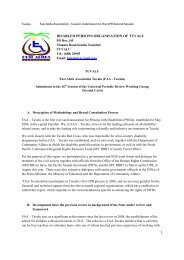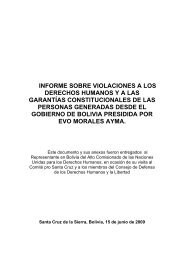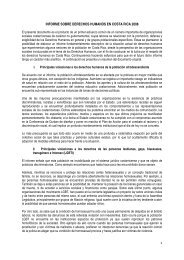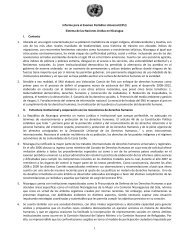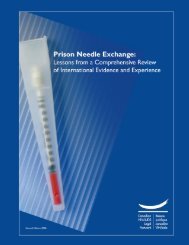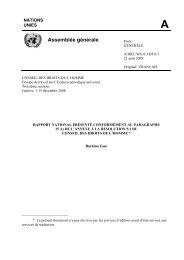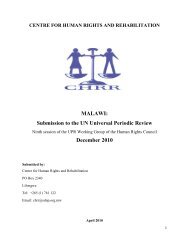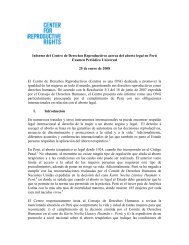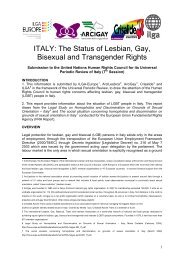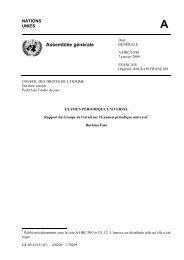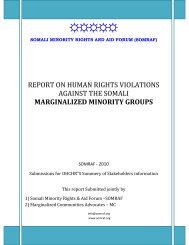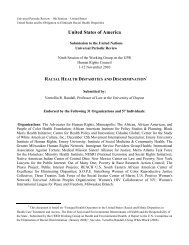JOINT STAKEHOLDERS REPORT ON - Universal Periodic Review
JOINT STAKEHOLDERS REPORT ON - Universal Periodic Review
JOINT STAKEHOLDERS REPORT ON - Universal Periodic Review
You also want an ePaper? Increase the reach of your titles
YUMPU automatically turns print PDFs into web optimized ePapers that Google loves.
agricultural sector. In 2007, the Arjun Sen Gupta Commission on the unorganized sector<br />
assessed that the bulk of agricultural workers (90.7%) and rural workers (64.5%) were<br />
paid less than the national minimum wage of Rs 66/- a day. The Commission declared that<br />
77% of the Indian population lived on less than Rs 20/- per day, the majority of them<br />
being SCs. Many such socio-economic conditions call for safeguarding the right to social<br />
security of all those categories of workers, including SCs.<br />
35. Rights of Scheduled Castes with Disabilities: Although it is highly commendable that<br />
the GoI ratified the Convention on Rights of Disabled Persons and has now submitted its<br />
initial report, the SCs with disabilities have suffered for far too long the neglected<br />
dimension of social exclusion leading to cumulative discrimination besides the caste<br />
factor. It was reported that a physically disabled person from SC community could not for<br />
a long time use the tricycle presented by the government simply because the caste Hindu<br />
‗road rules‘ could not be violated. With an estimated figure of 1.8% of persons with<br />
disabilities among the overall population, the 2.4 % among SCs is shockingly very high.<br />
This shows that the existing policies and practices of the national and state governments<br />
are not successful in providing adequate social safeguards to SCs with disabilities 35 .<br />
36. Disaster Risk Reduction and Scheduled Castes: Another major concern, especially as a<br />
consequence of the devastation caused by the 2004 tsunami, is related to natural and man-<br />
made disasters affecting sizeable populations in the country, including SCs. National Dalit<br />
Watch observed that the impact of disaster, in its nature and intensity, varies according to<br />
the degree of vulnerability of the social groups that constitute the affected population.<br />
Although in principle the disaster response is expected to focus on humanitarian<br />
principles, including the principle of neutrality (equal approach to all disasters), the<br />
existing laws, policies and guidelines of the national and state governments are not<br />
comprehensive enough to capture the sensitive issue of caste based discrimination in<br />
emergencies 36 .<br />
V. Implementation of National Legislations, Policies and Schemes<br />
37. The Indian Constitution as well as legislations, policies and schemes ensure SCs the<br />
protection and promotion of their social, economic, educational, cultural and political<br />
interests in order to remove the disparities suffered by them and to bring them on par with<br />
other sections of the society. Examples of the latter are: The Untouchability Practices Act,<br />
1955, Protection of Civil Rights Act, 1976, SCs and STs (Prevention of Atrocities) Act,<br />
1989, The Employment of Manual scavengers and Construction of Dry Latrines<br />
(Prohibition) Act, 1993, Bonded Labour System (Abolition) Act, 1976, Minimum Wages<br />
Act, 1948, Equal Remuneration Act, 1976, Child Labour (Prohibition and Regulation)<br />
Act, 1986 etc. To curb unequal distribution of economic assets, Land Reform Policy and<br />
the Special Component Plan were introduced.<br />
35 Dalits with Disabilities, the Neglected Dimension of Social Exclusion, Govinda Pal, IIDS, 2010<br />
36 Report of the National Convention on “Exclusion of Dalits – Disaster Risk Reduction Interventions – Effective Civil<br />
Society Monitoring”, National Dalit Watch, June 2010<br />
10



